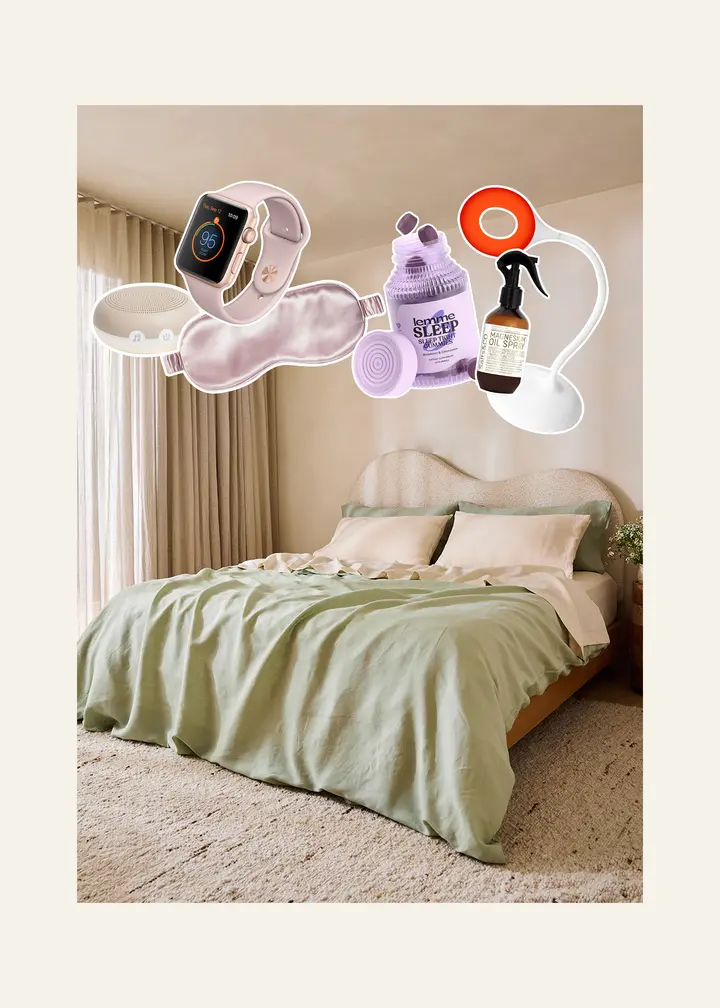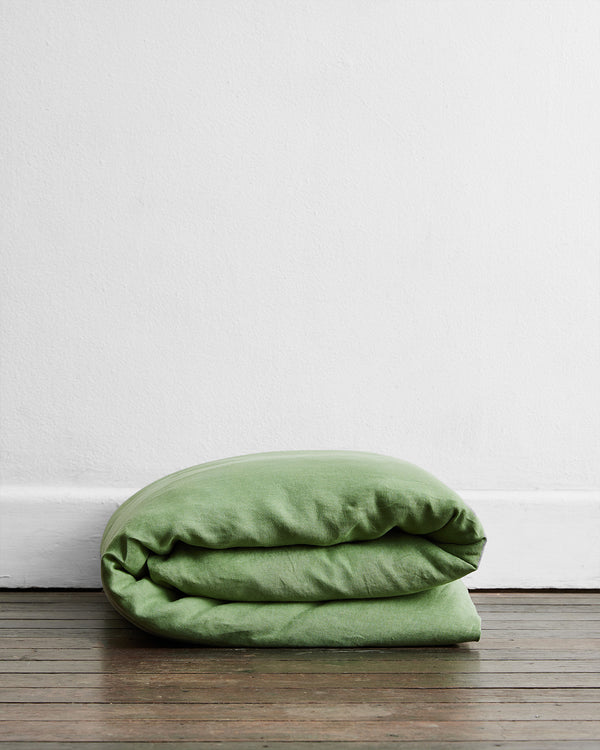
The Rise of Sleepmaxxing – How TikTok Made Us Obsessed With 'Perfect' Sleep
What happens when sleep stops being restorative – and starts becoming performative?
Bed Threads Editor Arabella Peterson takes a closer look at the internet’s growing obsession with sleep. In this feature, she unpacks the rise of Sleepmaxxing, a TikTok-driven trend that reframes sleep as something to curate, measure, and perfect.
The other night, while doom-scrolling TikTok in bed (yes, the irony isn’t lost on me), I landed in the melatonin-laced, lavender-scented world of Sleepmaxxing. Put simply, this trend involves hacking your way to the perfect night’s rest – hyper-curated bedtime routines promising glowier skin, sharper focus, and optimum wellbeing.
According to every clip I watched, my usual routine – shower, brush teeth, slap on some skincare – barely scratched the surface. If I really wanted to optimise my sleep, I needed magnesium sprays, sleep gummies, sunrise alarm clocks, and a bedtime routine with the production value of a Kardashian brand launch (speaking of sleep gummies).
I’ll admit: some of these products and rituals were tempting. The allure of a perfect night’s sleep – and therefore better mood, better skin, and ultimately, a better life – was hard to ignore. But when I considered everything that was being recommended – sprays and supplements, mouth tape, nasal dilator, eye mask, red light lamp, white noise machine, journaling, yoga, breathwork, and an Apple Watch to track my sleep – it started to feel like a serious time and energy commitment, without any guarantee it would actually help.
Jess*, a London-based art director, says that her sleep anxiety has escalated to the point where bedtime is a “source of stress, not rest.” She considers herself a generally anxious person with perfectionist tendencies, so once she went down the Sleepmaxxing rabbit hole, she was “completely consumed.” “It’s so easy to buy into this stuff. I definitely have sleep anxiety. As far as I know, they’re not able to formally diagnose orthosomnia yet – but I wouldn’t be surprised if I had it.” Jess says she often lies in bed replaying the day’s choices, wondering if something she ate or watched or forgot to do might affect her sleep. “It becomes this spiral – like I’m punishing myself for not sleeping well, even when I did everything 'right'.”
Professor Bartlett also explains that we tend to place an enormous onus on sleep. It’s undoubtedly important, but by anchoring our emotional wellbeing to it, we may overlook other factors that could be contributing to how we feel day to day. She works with individuals who believe their anxiety is entirely dependent on their sleep, telling her, “If you can fix my sleep, I'm going to be fine.” But, she notes, “Anxiety is normal… We all have anxious symptoms and depressive symptoms… And it’s not just sleep helping us cope with those things – it’s social interaction, it’s exercise, it’s diet.”
“It is important not to only blame our sleep if we are feeling irritable or really tired. We need to explore other possible factors, such as other sleep disorders, your mental and physical health. Are you isolated? Are you lonely? Are you fixating and pinning everything on your sleep? Sleep is important, but not so important that it rules your life.”
We can draw a pretty clear line between hyperproductivity culture and the desire to enhance sleep. Biohacking, self-quantification, and the pursuit of peak performance can lead people to want to optimise rest in order to optimise output. Zachary observes the impact of wellness and performance-driven content in his work: “I think people are generally a lot more health conscious now because of TikTok and other social media content. They listen to Huberman Lab or Joe Rogan or whichever crazy health podcast and take what is generalised information as dogma… Everyone is different though, and one rule doesn’t apply to everyone.”
In a goal-fixated culture, it seems we’ve leant into the productivity benefits of sleeping, while forgetting that there’s also value to gain from treating sleep as rest for its own sake, rather than self-improvement. Professor Bartlett encourages us to consider the restorative side of sleep: “Sure, you want to be able to perform at work or school or university. You might worry about the impact [of lack of sleep] on your memory, which are all valid things. But the other thing you want from sleep, which I think is just as important, is not having to feel responsible for anything for at least a few hours every 24 hours.” If we don’t relinquish the pressure to perform at night, she says life is like “Groundhog Day.”
As Professor Barlett suggest, “We have to be kind to ourselves – we have to be nurturing. We have to take a lot of the pressure off ourselves.” In a culture that commodifies even our downtime, it's no surprise that sleep has become another site of self-improvement. But the answer probably isn’t to simply abandon our rituals or throw our trackers in the bin, but to shift how we think about sleep altogether. Rest doesn’t need to be productive to be worthwhile and sleep doesn’t need to be earned – it just needs to be allowed.
If you or someone you know is experiencing anxiety around sleep, Professor Bartlett recommends speaking with your GP as a first step. The Woolcock Institute of Medical Research offers Cognitive Behavioural Therapy for Insomnia (CBTi) group programs, as well as one-on-one support through a team of six psychologists. Online resources like This Way Up and MindSpot from Macquarie University also provide accessible support and evidence-based tools.
*These names have been changed at the request of participants.
Unwind, Your Way
Enjoyed This?
Discover more on sleep and rest.













